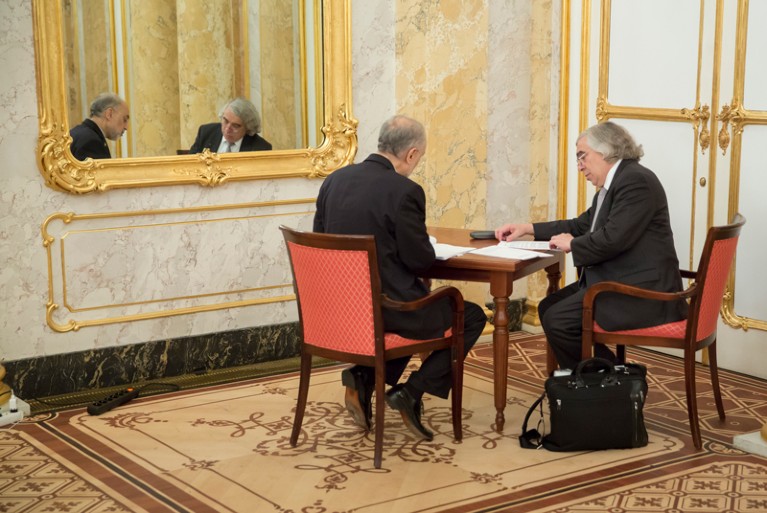
Scientists’ expertise has long been crucial for nuclear negotiations — as exemplified by Ali Akbar Salehi of Iran and Ernest Moniz of the United States.Credit: Thomas Imo/Photothek/Getty
Just days ago, it looked as if India and Pakistan were ready to go to war. Ambulance drivers and trauma surgeons were told to cancel leave; airports were shuttered and the skies cleared of commercial flights. The world held its breath as the two nuclear-armed nations shot down each other’s fighter jets. Thankfully, both sides have stepped back.
By coincidence, US–North Korea nuclear talks in the same week ended prematurely with no deal. North Korea will, however, continue its moratorium on nuclear tests for now, while the United States continues to suspend major joint military activities with South Korea.
The United States and North Korea are at least beginning to climb the ladder towards disarmament, however shakily. The South Asian countries, by contrast, are not even on the first rung. The big lesson from these most recent events is the need for an urgent global, or at a minimum bilateral, effort — one that includes researchers — to address the risks of undeclared nuclear arsenals. Stockpiles, according to the Stockholm International Peace Research Institute, are expanding.
Scientists have been at the heart of the most successful nuclear agreements, from the Soviet–US talks that laid the foundations for the global Comprehensive Nuclear-Test-Ban Treaty in 1996 to negotiations in 2015 on what is known as the Iran nuclear deal.
Researchers are central because they have advanced knowledge of the science and technology of nuclear-weapons development, testing, dismantling and verification. Indeed, it is often researchers such as Ali Akbar Salehi, head of the Atomic Energy Organization of Iran, and former US energy secretary Ernest Moniz — who both worked at the Massachusetts Institute of Technology in Cambridge — who negotiate and write the words.
Historically, nuclear diplomacy has focused on global agreements; the latest is the troubled Treaty on the Prohibition of Nuclear Weapons, which opened for signature on 20 September 2017. But India and Pakistan — along with Israel — will not sign until the five permanent nuclear-weapons states (the United States, Russia, China, France and the United Kingdom) agree to do so, and that is even less likely. A more effective approach would be to build on existing agreements, starting with a 30-year-old bilateral agreement between India and Pakistan, in which scientists and engineers from each side swap lists of facilities, with their governments pledging not to attack.
This accord could be broadened to include a pledge that lists are accurate and that neither side will attack essential infrastructure, especially large dams, says Toby Dalton, co-director of the Nuclear Policy Program at the Carnegie Endowment for International Peace in Washington DC. He adds that the countries could also agree to exchange information on the ability of domestic extremist groups to acquire nuclear technology.
This could be instigated by each country’s scientists, or through membership of the InterAcademy Partnership of scientific academies that work together on global problems. They have a duty to use these links, and their influence with the media and politicians, to take this step.
One of the biggest hurdles to all such undertakings, bilateral or multilateral, is an understanding that the greater threat is doing nothing towards disarmament. In that respect, the US–North Korea talks are at least in play. Eventually, India and Pakistan also need to begin a formal process. The people of South Asia were genuinely shaken by last week’s military action. The world can no longer afford to live with the risk that this action could have led to all-out war.

 How science will suffer as US pulls out of Iran nuclear deal
How science will suffer as US pulls out of Iran nuclear deal
 North Korean disarmament: build technology and trust
North Korean disarmament: build technology and trust
 Scientific steps to nuclear disarmament
Scientific steps to nuclear disarmament






